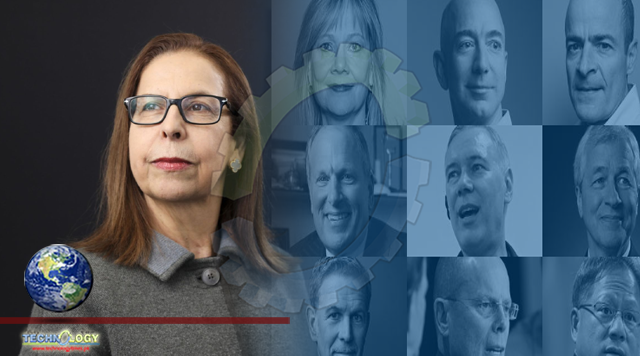There will be a lot more businesses run by black and brown people and women in five years. Post-Covid and the recent U.S. election are going to accelerate the trend. Sustainable and ESG investing will be mainstream in public and private investments.

By Reshma Kapadia
Afsaneh Mashayekhi Beschloss, founder and CEO of RockCreek, has a history of spotting investment trends early. At the World Bank, she invested in clean energy decades before climate change was a global priority.
An Oxford-trained economist, Beschloss, 65, also held senior roles with Shell and the Carlyle Group before founding Washington, D.C.-based RockCreek in 2003. Today the firm manages $15 billion on behalf of pensions, endowments, and foundations, with a focus on multi-asset, sustainable, and emerging-markets strategies.
Barron’s: What will be the greatest investment opportunity post-Covid?
Afsaneh Mashayekhi Beschloss: Climate. It is going to be huge in terms of investments—both in the move toward efficiency and making sure systems are such that they less gas gets into the environment—and everything related to water and energy. The private sector is going to lead. Companies are moving toward clean energy because they know it’s not just regulation; it’s their consumers [demanding it].
With the amount of interest even today in solar energy, there aren’t enough service companies producing parts for wind and solar [energy]. We will see growth in the next three to five years, and those are [areas] that are more job-creating.
A World Resources Institute study found that for every $1 million you spend on [clean energy], you create more than two times as many jobs as when the money is spent in traditional energy.
RockCreek had been investing heavily in education, including distance learning; biotech and telemedicine; and renewable energy. What investment trends will we be talking about in the next five to 10 years?
The pandemic put on a different slope a lot of things, particularly biotech and health. The technology to develop [a vaccine] faster is also being directed to other medicines. In five to 10 years, in emerging markets, the health sector, which has grown from 1% to 3%-4% [of GDP], will probably be closer to 10%.
We have been making direct investments and co-investing with venture capital in both health-care delivery systems and biotech. Also, the delivery of education will be different. With around 45% of the world not having access to the internet, governments will have to provide more of [the digital infrastructure], and that means investing in the delivery system for the internet for that last mile.
How will ESG investing evolve?
There will be a lot more businesses run by black and brown people and women in five years. Post-Covid and the recent U.S. election are going to accelerate the trend. Sustainable and ESG investing will be mainstream in public and private investments.
What is the most important public policy issue the U.S. will face post-Covid?
The biggest risk to our system is education. Investing in education is key if we don’t want to lose our edge in innovation.
How should investors think about diversification?
Bonds offer no return in the next five to 10 years. Governments are encouraging companies to take on more loans. The International Monetary Fund is encouraging countries to take on more loans. At all levels, there’s more leverage.
The risks that investors are taking are around leverage, credit, and illiquidity—and they aren’t measuring them well enough. It’s one thing if private equity is 10% of a portfolio; if it is 30%, that’s very different.
What will investors need to own to boost returns in the future?
Think about the 10 largest companies 10 or 20 years ago. What will they be in 10 years? We know they will be different. Exxon Mobil [XOM] has shown it won’t be one of the largest companies in the next five years because it didn’t invest in renewables in the way that BP [BP] and Royal Dutch Shell [RDS.B] have. Energy has gone from 10% to 3% of the S&P 500 index.
Now, it will be about technology—its use in education, health, cities, buildings, and energy. Those will be the jobs of the future. If you are an investor and don’t continue to find the companies of the future, you will be left behind. The speed of innovation is going to increase. That’s a risk because a lot of big institutional investors haven’t been oriented toward venture [capital].
You have long focused on emerging markets, an asset class now dominated by China, North Asia, and India. Should EM investors cast a wider net?
China and North Asia should be their own group. You have to look to frontier markets and countries like Vietnam. India will be very interesting; Eastern Europe and Latin America will be interesting. I worry about Africa because a lot of the attention to [it] went away during Post-Covid and a lot of debt that African countries owe is to China.
How will investors approach China in five years?
You can’t not invest in China. The [renminbi] could be not a reserve currency but a more important currency to hold in your portfolio. It will be more common for 30% to 40% of a portfolio to be in [different] currencies rather than [fully] hedged in the next few years because of the size of our debt versus other countries.
Our focus has been on companies that benefit from local growth. If there are restrictions from the West [on Chinese technology], it won’t affect local companies and trends. Companies that are highly political, or defense or state-owned enterprises, or telecom-oriented, could be tricky.
In five years, I think government restrictions will be replaced by investor restrictions—similar to investors who don’t want to own stocks of private-prison companies now.
What is the one place that you’d most like to visit when the pandemic ends?
That is really hard. I really would love to be in Europe.
Originally published at Barrons